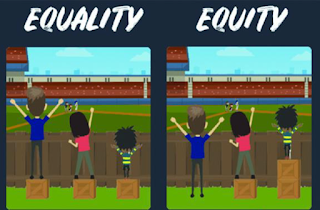What is equity?
Equity means 'even, just, equal'. Not to be confused with 'equality', however. The difference between those two terms is that one is achieved by treating everybody equal regardless of their innate differences or needs and thus achieving in most cases unjust outcomes. While in equity, everyone would be treated differently according to their difference in order to achieve a same outcome for everybody involved.
In jurisdictions following the English common law system, equity is the body of law which was developed in the English Court of Chancery and which is now administered concurrently with the common law. In common law jurisdictions, the word "equity" "is not a synonym for 'general fairness' or 'natural justice'", but refers to "a particular body of rules that originated in a special system of courts."
For much of its history, the English common law was principally developed and administered in the central royal courts: the Court of King's Bench, the Court of Common Pleas, and the Exchequer. Equity was the name given to the law which was administered in the Court of Chancery. The Judicature Reforms in the 1870s effected a procedural fusion of the two bodies of law, ending their institutional separation.
Jurisdictions which have inherited the common law system differ in their current treatment of equity. Over the course of the twentieth century some common law systems began to place less emphasis on the historical or institutional origin of substantive legal rules. In England and Wales, Australia, New Zealand, and Canada, equity remains a distinct body of law. Modern equity includes, among other things:[3][4]
- The law relating to express, resulting, and constructive trusts;
- Fiduciary law;
- Equitable estoppel (including promissory and proprietary estoppel);
- Relief against penalties and relief against forfeiture;[5]
- The doctrines of contribution, subrogation and marshalling; and
- Equitable set-off.





Comments
Post a Comment